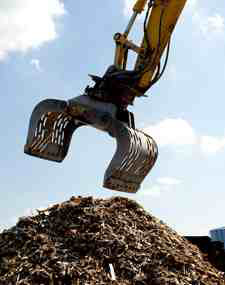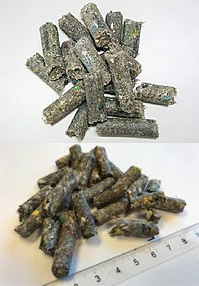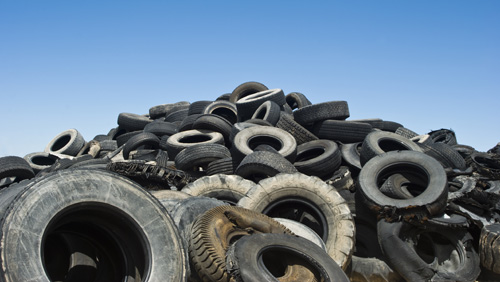SRF Fuel production from the UK is mainly 18-20 MJ/CV, moisture/ash less than 15% and chlorine less than 1%. Fuel production is made up from MRF residue from C&D/C&I waste streams, and processed to sub 40mm specification. No waste containing organics from food streams are permitted within the specification of the fuel.
Specification generally consists of:
This is then suitable as a high grade fuel for kilns requiring a fossil fuel substitute.
The Environment Agency are currently looking at the classification of RDF and SRF for a better description and European waste identification coding for fuel used in incineration and kilns.
We are able to supply thousands of tonnes of good quality fuel per week from across the UK, loose, baled and wrapped. Access to ports have been identified to export fuel from various locations across the UK, once TFS notifications are in place.
We have a very good quality control system in place with all fuel producers/suppliers who are showing signs of providing better quality fuels with our advise and expertise with alternative fuels. You can see a sample analysis report here.
Mainly MSW ( Municipal Solid Waste), consists of black bag/general waste streams from household and canteen waste streams, and ideally suited for waste to energy incineration plants that can deal with low heating values and wet fuel.
Specification are:

Biomass fuel consists of non-hazardous waste wood that is recycled, chipped and sized to the customer’s specification.
Biomass fuel is sustainable, low in carbon and can be used for many purposes, including the generation of electric energy.

Pelletising fuel from waste such as SRF we believe is the way forward for the cement industries and many more users of waste for fuel. The fuel once it has gone through its process and pelletised, is compact, very durable and extremely dense. The pellets are fed into the grinder alongside the coal, ground to a dust and then fired into the burner.
This method allows the cement manufacturers existing feeding system to remain intact and unchanged. The whole process significantly lowers moisture which is obviously a big plus. We can produce this material to many specifications.
Please contact us to quote on your requirements.
The disposal of used tyres in the UK is a significant issue that could literally be costing us the earth. Due to heavy metals and other pollutants found in tyres there is a potential for leaching of toxins in to the water table. This is dangerous to human health and other organisms. Because rubber is a durable material the tyres will remain a source of pollutants for 50-80 years if they are land filled. It is therefore imperative that they are recycled correctly.
The European Union Landfill Directive is an important driver for used tyre recycling as it bans the disposal of tyres to landfill. Presently the UK recovers around 100% of these tyres due to the landfill ban. Whole tyres were banned in 2003 and shredded tyres were banned in 2006. This means that no tyres are allowed to be dumped in landfill sites, with the exception of bicycle tyres.

Every day in Britain over 150,000 worn tyres are taken off cars, vans and trucks accounting for a total of around 55 million tyres (460,000 tonnes) per year. Of this figure, around 40 million tyres are from cars, with truck and van tyres making up the remainder.
Used tyres are sorted for use through one of four main options:
re-treading, re-use into part worn market, material recycling and energy recovery.
Used tyres are gathered from a number of sources, including garages, specialist tyre retailers and scrap yards. There are many ways of putting used tyres to good use, although broadly all of these can be defined as re-use, recycling or recovery. Re-treading is considered to be one of the most preferable and effective methods of re-using worn tyres since the process effectively doubles the life of a tyre, reducing the numbers of new tyres needed and thereby minimising waste. Not all casings are deemed acceptable and the re-tread companies are very specific about the sizes that they require. Many customers are also not happy with the idea of having what could be deemed a second-hand tyre on their vehicle. The recycled rubber from end-of-life tyres can be processed into rubber shred and crumb in grades of different particulate size which are then suitable for incorporation into a wide range of new products. Shredded or crumbed rubber can be used for a number of applications including surfacing for equestrian, sports and safety surfaces, carpet underlay, street furniture and acoustic barriers, as well as the material being incorporated into the production of new tyres. It can also be used for road surfaces.

Tyre derived fuel, TDF as it is more commonly known in the waste recovery sector, is an extremely well-trodden path. Tyre-derived fuel is made by reducing end of life automotive tyres into shreds. The tyres go through a multi-stage process that takes the tyres into a product typically sized between 20-80mm to burn as a fuel source. Through this process most of the steel in the tyres is removed, along with much of the fibre. Tyre-derived fuel is widely regarded as a viable alternative to fossil fuels, producing a similar amount of energy as oil and up to 20% more energy than coal. Tyre-derived fuel produces less moisture, sulphur, nitrogen and ash residues, which results in lower carbon emissions for the environment.
An estimated that 400,000 tonnes of waste carpets arise in the UK per year. Traditionally most of these were going to landfill rather than being recycled or reused. As potentially reusable resources were left to biodegrade over a number of years at considerable financial and environmental cost, new resources were being extracted for the carpets that were being laid to replace them, and for the many other things that the recycled material could have been put to use for.
Slowly the tide is turning:
But more can still be done…
With our recycling processes at our Tilbury Docks location Alternative Fuels Inc provide a reliable, efficient and effective carpet recycling service for clients including:
Because of the size of our facilities, and the fact that we only deal with organisations who have large volumes of carpets and other materials for recycling, we can keep our running costs low, and make maximum use from the natural and synthetic fibres we extract from carpets and unwanted carpet materials.
All the materials we extract are recycled for use in a range of products including insulation and sports surfaces as well as in new carpets and underlays, or converted into use as fuels and other energy sources.
Recycling carpets helps councils and companies meet their recycling targets and contribute to the environment by diverting waste from landfill, thereby making further use of them and reducing the drain on unused resources.
Alternative Fuels Inc provide full recyclying reports so that all our clients have a verifiable record of the volume of material they have sent for recycling and the use that has been made of it.
For further information Contact Us TODAY on 07939 020021